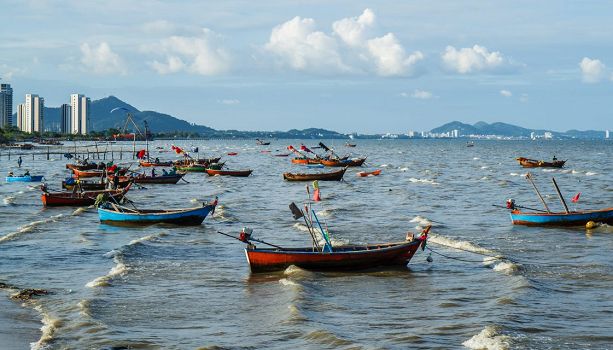
Climate change forcast to devastate West African fisheries in coming decades
Overfishing and illegal fishing are not the only factors contributing to dwindling fish stocks in the once fertile waters of West Africa.
Some West African countries are forecast to see their fish stocks decline by 85 percent in the coming decades due to unabated climate change, according to a first-of-its-kind analysis into country-by-country climate impacts on key ocean sectors.
Advertisement
Titled “the expected impacts of climate change on the ocean economy” , the report, commissioned by the High Level Panel (HLP) for a Sustainable Ocean Economy, assessed global to local climate impacts on three of the largest sources of ocean-based revenue and jobs, coral reef tourism, wild capture fisheries and marine aquaculture.
The report examiine the predicted impacts of climate change on three of the largest sources of ocean-based revenue and jobs - coral reef tourism, wild capture fisheries and marine aquaculture.
The analysis also indicated that climate change would have wide-ranging and severe impacts on the ocean and ocean-based economy, particularly in developing countries along the equator which “often rely on reef tourism and fish stock to sustain local livelihoods and ensure food security, according to the study.
Globally, 30.6 million people participate —either full time, part time, or occasionallyin capture fisheries.
According to the report, coral reef tourism, worth over US$35 billion globally every year in countries including Egypt, Mexico and Australia, is also expected to see a severe impact by climate change with a forcasted revenue losses of over “90 percent across all regions”, adding that even if action was taken to cut carbon emissions, the industry was still expected to suffer economic losses of up to 66 percent.
The HLP is a unique initiative of 14 serving heads of government, including President Nana Addo Dankwa Akufo-Addo from Ghana, committed to catalysing “bold, pragmatic solutions for ocean health and wealth that support the United Nations Sustainable Development Goals and build a better future for people and the planet.”
The groupe worked with governments, experts and stakeholders from around the world to develop a roadmap for rapidly transitioning to a sustainable ocean economy and to trigger, amplify and accelerate responsive action worldwide.
The analysis detailed the wide ranging and severe impacts that climate change would have on the ocean and ocean-based economy and called for a forward looking, cooperative and equitable global response.
“A major finding is the extent to which fish will migrate to cooler waters as the ocean warms and becomes more acidic under future climate scenarios. This will jeopardise fishing communities in some regions and increase the potential for conflicts over shifting resources”, the report said.
It called for a forwad looking, cooperative and equitable reponse to managing the impacts of climate change on the economy.
It further emphasised the importance of adaptive fisheries management and new cooperative agreements accross national, regional and international boundaries to ensure that species were well managed as suitable habitats shift and cnage.
“In these circumstances, developing sustainable and climate resilient marine aquaculture could be an important part of the solution for some countries. To help preserve the reef tourism industry, the resilience of ocean ecosystems must be enhanced through conservation and restoration and other measures, such as reducing the climate impact of tourism”, the report said.
Comenting on the report at the United Nations (UN) Climate Change Conference (COP25) in Madrid, Nana Addo Dankwa Akufo-Addo, President of the republic of Ghana lamented that climate change was likely to exacerbate global inequities and make it harder for developing countries to withstand its dire impacts.
According to him, African leaders needed to be forward looking, cooperative and equitable in ordere to achieve the objective of an Africa beyond aid while averting the rise of resource conflicts on the continent.
“We need to rethink how we manage our marine resources as species shift in and out of waters is vital, not only for our sustainable food production and prosperity, but for our very survival over the medium term.”, the President stated.
Mr Steve Gaines, co-author of the analysis and HP Expert Group Representative, said “Only now are we starting to comprehend the full force that unabated global heating will unleash on our key ocean industries and it is chilling”.
To avert an impending economic crisis, widespread devastation to communities, hunger and resource conflicts in coming decades, Mr Gaines said World leaders must urgently work towards restoring ocean health.
That, he said would means taking rapid and ambitious actions to curb climate change, while easing the other enormous pressures on the ocean.
“If we limit carbon emissions and fast track sustainable and adaptive fisheries management, the ocean can still be a major source of food, nutrition, livelihoods and wellbeing for billions of people around the world,” says Eric Schwaab, Senior Vice President, Oceans, Environmental Defense Fund and High Level Panel Advisory Network member.
The report warns that collectively, “it is estimated that ocean-based industries and activities contribute hundreds of millions of jobs and approximately US$2.5 trillion to the global economy each year, making it the world’s seventh-largest economy when compared with national gross domestic products.”
The Intergovernmental Panel on Climate Change recently estimated that climate-induced declines in ocean health will cost the global economy $428 billion per year by 2050 and $1.979 trillion per year by 2100.



